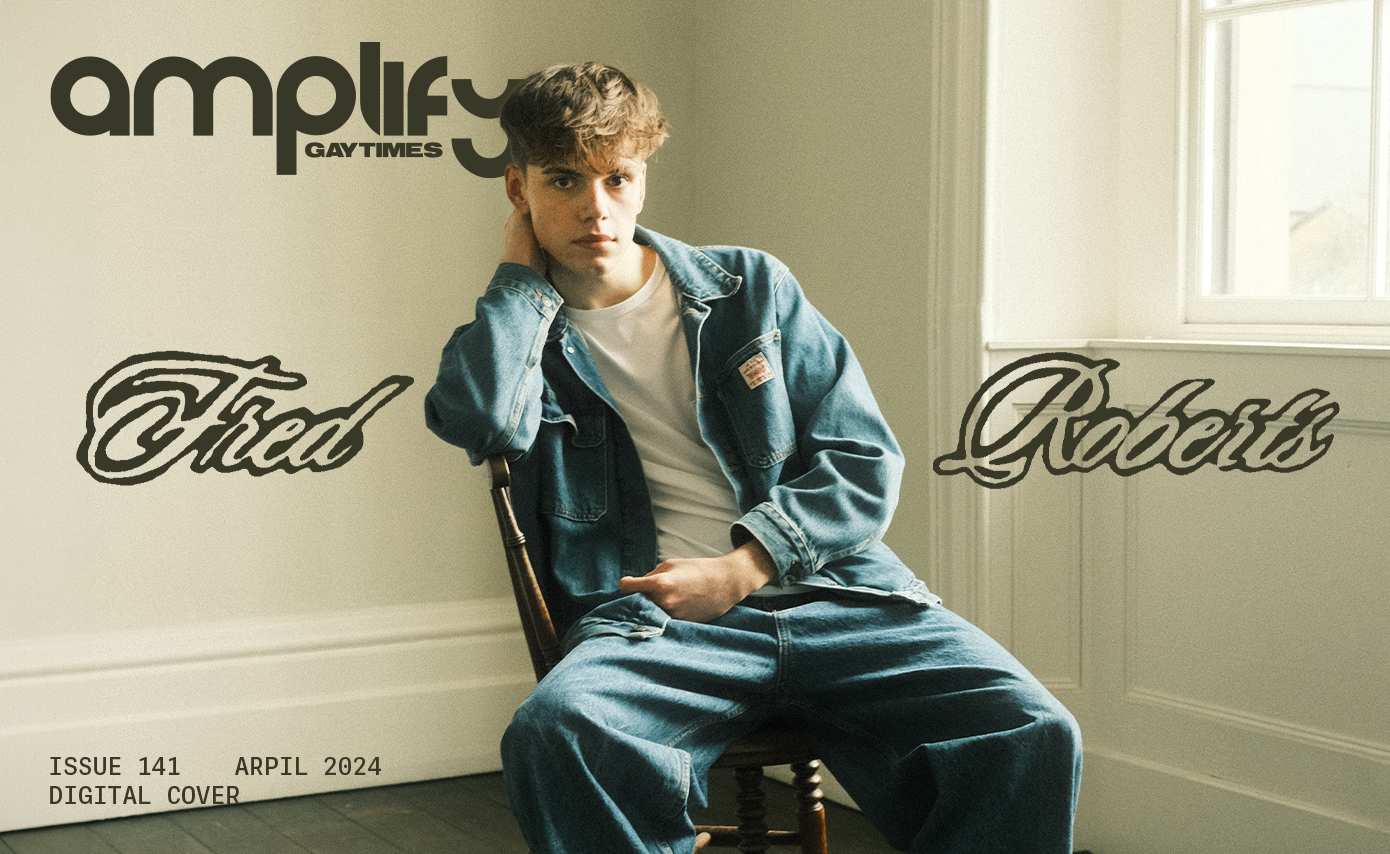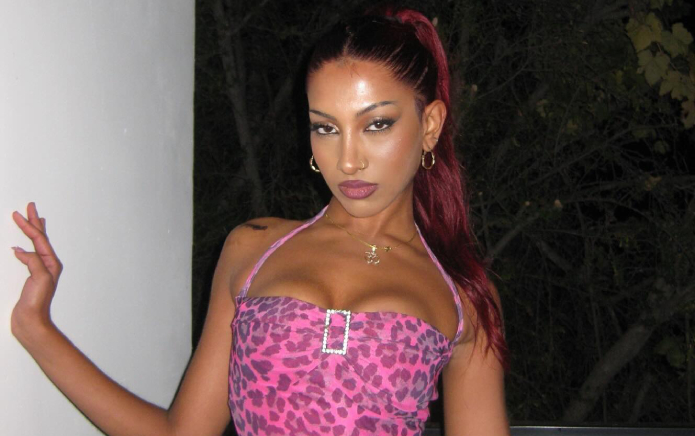
There’s a boyish eagerness to Fred Roberts. The rising 21-year-old artist wants his music to connect, to resonate, with his audience in the way his favourites – like Troye Sivan – have with him. On his debut EP, Sound of My Youth, the singer unravels his queer coming-of-age story through open-hearted lyricism and moving pop ballads. “I spent a lot of time making sure the EP was perfect,” he says, reflecting on its launch this month. To commemorate its arrival, the Hertfordshire-raised artist invited a small cohort of fans to Shoreditch Strongroom, a studio space not far from our current noisy spot. “It reminded me that my music is having an impact,” he says earnestly. “I feel like [Sound Of My Youth] has given me closure.”
Roberts’ lead single ‘Runaway’ is an explosive opener that boldly introduces the UK act as a must-watch rising star. An intimate pop anthem, he hooks diaristic lyrics to big beats, earning him a standout song for his discography. “Before I released music, there were a lot of factors in my life stopping me from doing certain things, whether that be insecurities, and not being able to follow my gut with everything,” he explains.
Now, maturer, Roberts feels like he’s gaining a clearer understanding of himself, even if by unconventional means. From sweaty late nights in Brighton’s Revenge to hours spent in Irish pubs in Rome, new experiences have coloured his perspective with valuable adolescent life lessons – a fresh way for the singer to explore his identity. “I’ve never been to a gay club before Revenge!” he laughs, eyeing up music posters nearby. “Over the course of this year, I feel like I’ve not been answering to anyone or living for anyone else and that’s the most important thing.”
As we settle into a navy blue cafe couch in Aldgate, the details of Roberts peek through. He’s wearing a heather grey jumper, dark jeans and white Adidas trainers. A silver necklace twinkles in the bright room, an accessory he occasionally plays with when sifting through his thoughts. The necklace, a gift, is a small personalised pendant inscribed with the letters ‘SOMY’, the initials of his EP. Inside, there’s a roughly fitted picture of his close friends, people that, he says, inspire him. His close circles have been instrumental in getting him where he is today. As a teenager, in 2019, Roberts landed a spot on X Factor: The Band. Encouraged by those closest to him, he completed the two-week experience and emerged with a renewed understanding of what he wanted his career to look like. Here, several years later, he’s since signed to Universal Music and released his biggest personal project to date. “Fans have given my music purpose which, in a sense, has given me purpose. It’s allowed me to have this confidence” he says. “If I was releasing music 10 years ago, I would not have been as open as I am about my sexuality or my story.”
Having reflected on his new milestone, the singer is grateful for his progress but he’s ready to move on – ready to become the next big breakthrough act. His music is sincere and his lyrics, he admits, are at times a little too honest. A five-track compilation, his EP lends a shared eye to Roberts’ perspective, letting us into his intimate moments whether this is shedding the weight of a break-up or indulging in the euphoria of first queer love. He cites Blue Neighbourhood, an electro-pop debut album from Troye Sivan, as an emotional blueprint to him. “You think that artists are these otherworldly creatures, no matter how big or small they are,” he says. “But, everyone’s terrified and putting their heart on the line but they want to keep doing it because they love [being an artist].”
However, Roberts has, surprisingly, found himself in a unique spot as a young openly gay male artist in the British music scene. As we see a rise of queer male talent overseas – from Lil Nas X to Omar Apollo – there is a seeming lack of gay, Gen Z male artists landing in the UK charts or radio waves. “I think people are scared [to come out] and no one wants to do anything wrong,” he says. From his own experience, he’s considered how his music will be received and discussed with family and friends what it means to be out, publicly. “If I take a risk by talking about who I am it’s my decision but, for me, you can’t live your whole life not being open. People shouldn’t have to talk about sexuality, but because of how that impacts people’s lives that’s why I talk about it. I could release music and give no context but, I’m noticing that I have a connection with people and that’s what it’s all about.”
https://www.gaytimes.co.uk/music/queer-and-now/queer-now-fred-roberts-is-a-gen-z-pop-star-interview/
As the music industry moves forward, Roberts hopes the UK scene is able to become more accommodating to LGBTQIA+ talent. “I’m aware there are not many male singers who are gay and out about it [because] if they did come out, maybe they’d lose [listeners] because not everyone’s okay with it,” he says. The concern for how you’re perceived is an understandable anxiety. For many queer people, we root ourselves in communities and art that resonates with us, but what if you have to be the one leading the way? Roberts sits with his thoughts, mulling over the topic. We cycle through discussions of queer fandom: Towa Bird, Ethel Cain, Chappell Roan, and Reneé Rapp – new female and sapphic stars that have found a community among LGBTQIA+ listeners, yet there’s a notable lack of openly gay male acts. “There’s a need for it. The majority of media is straight and it would instantly pull in a whole wider audience,” he says. “I’ve never felt so supported by queer fanbases. I know a lot of my fans are queer [and] they are desperate to have something themselves.”
I’ve never felt so supported by queer fanbases. I know a lot of my fans are queer [and] they are desperate to have something themselves
The demand for queer artists, to Roberts, needs to be heard by music labels, executives and other leading musicians. Only with support, he says, can LGBTQIA+ talent meet the trajectory they deserve. “Look at Heartstopper, for example, people were saying we didn’t know how big it was going to be but, of course, it’s going to be big,” he says. “There isn’t a young teenage show dedicated to queer people like that. So, if you’re going to put that out on Netflix and put money behind it, people are going to eat up. Young Royals, too, and I love that show. You create media [like] music, TV or films that represent an underrepresented community and people are going to love it.”
The cafe speakers crackle and soft pop pools into the room, pulling Roberts’ thoughts back to music. “My EP is out,” he says, almost as a reminder to himself. He’s deliberating what’s next. “It’s a business and I’m feeling the pressure that I need to keep this going,” he says tugging at his necklace. “I can’t sit back and release whatever I want to. There is that thought of how am I going to reach more people and do that authentically [in a way that] translates to everyone else.” He’s been thinking, recently, about what it takes to become the next big thing.
While many of us may find our favourites through charts, music listings or vinyl stores, Roberts vouches for how the internet amplifies new gay acts and provides a space for upcoming LGBTQIA+ acts to find a community. However, as TikTok faces challenges with music labels pulling music and a potential ban in the US, the future of online queer spaces seems uncertain. But, for now, it’s a platform allowing queer artists to connect and share each other’s music without necessarily having to be publicly out. “If there’s a big queer artist out there, they’re on my [For You Page] because there’s not that many. I know others. I could name a handful of people. I won’t name them, but I could name a few who are in music and are not out right now. I think about those people and question who else is actually in that space.”
So as Roberts continues to find new audiences online, he’s excited for the opportunity to connect with fans IRL this summer — with appearances scheduled at a handful of notable UK festivals such as Y Not Festival, Monument Festival, and Camp Bestival. “I’ve got these festivals which are sick and I’m writing. A lot of the music I’m writing now is very much yearning, full and sad but it does come with more maturity and a bigger understanding of what everything means to me, and that’s what matters.”
Sound of My Youth is out now via Universal Music
